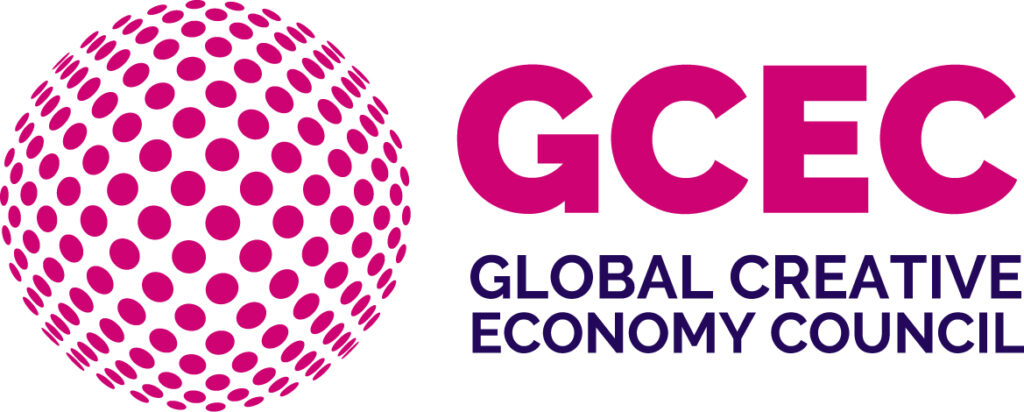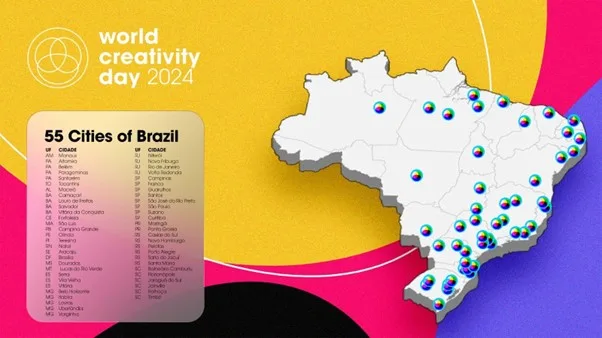Edna dos Santos-Duisenberg (member of Creative PEC’s Global Creative Economy Council) & Lucas Foster, founders of the World Creativity Organization, explain where it came from and what it is trying to achieve.

A blog from Creative PEC’s Global Creative Economy Council
In the global landscape, where creative ideas shape the course of progress, the World Creativity Organization catalyses the transformative force of creativity and innovation. Its origins date back to a bold vision by Brazilian entrepreneur Lucas Foster, who initiated the World Creativity Day in 2014. Initially conceived as a local celebration in Brazil, this event evolved beyond borders, resulting in the founding of the World Creativity Organization (WCO), an entity dedicated to promoting creativity as a driving force for positive change on a global scale.
The São Paulo Consensus
At the XI Conference of the United Nations Organization for Trade and Development (UNCTAD) held in June 2004 in São Paulo, Brazil, the UN received its first mandate, negotiated by 153 countries, to include the creative economy in the international economic and development agenda, the so-called “São Paulo Consensus”. Subsequently, the UN Creative Economy Report 2008, the first comprehensive study presenting the UN perspective on this emerging topic, became a world reference for policymakers and academia.
In Brazil, the UN influenced several initiatives and events focusing on the creative economy as a development strategy. A proposal for the creation of an International Center on Creative Economy (ICCE) in Brazil, was put forward by the Brazilian Ministry of Culture with support of several governments including the United Kingdom. Regrettably, the creation of the ICCE has not materialised. Nevertheless, the idea that an independent international entity, open to different stakeholders, to be set up in the spirit of partnerships, to nurture the creative economy through creative entrepreneurship and networks, remained in the air.
The seeds of the World Creativity Day
In 2011, the Manifesto SP+C São Paulo+Creative – a movement for a more creative city – called on creative people from across the city to rethink their relationship with the metropolis. The SP+C Manifesto became the embryo for what would become World Creativity Day, a global platform that promotes creativity in all its forms. (Note: On the occasion of Rio+20 UN Conference on Sustainable Development in 2012, the SP Manifesto was endorsed by Edna dos Santos-Duisenberg, Chief, Creative Economy Programme, UNCTAD.)
In 2014, a milestone meeting held in São Paulo with the presence of John Howkins, marked by inspiring dialogues, received an emblematic name: World Creativity Day (WCD). This title captured the essence of the event, and seeded the idea of a global celebration of creativity that would resonate far beyond that singular moment.
In 2017, three years after the first edition of WCD in São Paulo, the adoption of United Nations Resolution 71/284 made, World Creativity and Innovation Day (WCID), 21st April, the official date of global observance by the United Nations, starting in 2018.
Despite the UN designation, WCID’s impact depends on the engagement of individuals and organisations passionate about promoting creativity and innovation as catalysts for positive changes. This participatory and collaborative grassroots approach highlights intermediaries’ key role in addressing global challenges. It shows that a proactive and committed civil society is able to promote a creative transformation. WCID has gained momentum and became the largest movement driven by young creatives committed to increase awareness about how creativity drives sustainable development.
The World Creativity Day
World Creativity Day is now a major festival, organised annually in the week of April 21st. The aim is to inspire people to shape projects and businesses, inviting communities and municipalities to become more creative and innovative; by mobilising creative leaders, promoting collaboration between people and agents, fostering innovative ecosystems, productive inclusion, and creative entrepreneurship.
Its decentralised and collaborative format empowers protagonists in local communities to coordinate dozens of simultaneous festivals in cities throughout the country, respecting regional interests, giving voice to local talents, and offering free access to creative activities and cultural experiences.
Brazil Creative Award
The Brazil Creative Award was established by WCO in 2014 on a biannual basis, supported by the Ministry of Culture and sponsored by a private company. It covers fifteen fields related to the creative economy. All winners participate in a documentary film which they can then use as publicity. The Award stimulates creativity and contributes to promoting Brazilian creative products in the local and global markets, a soft power showcase for the country’s culture, creativity, and innovation.
The pandemic effect
The pandemic underscored the need for inventive solutions to navigate unprecedented challenges, emphasising the linkages between creativity, innovation, and the sustainable development agenda. Creativity emerged as a crucial source for steering the post-pandemic future and the United Nations Office for Project Services UNOPS, sought support from the WCD’s collaborative structure to identify startups and innovations that could be quickly adopted by hospitals, schools and municipal departments.
From World Creativity Day to World Creativity Festival
In 2018, 14 Brazilian cities enthusiastically joined WCD. The country’s main news channel featured live broadcasts, which validated the initiative and helped to establish World Creativity Day as a national festival.
In 2019, 50 cities participated. This number jumped to 89 in 2020, and an impressive 128 cities in 19 countries at the height of the COVID-19 pandemic in 2021, including Los Angeles, Barcelona, Tokyo, Dubai and Maputo.
In 2021, during the pandemic, WCD in partnership with private educational institutions distributed about 100,000 scholarships allowing people to develop new skills to face the new reality. This reinforced WCD’s commitment to education and innovation.
In 2024, World Creativity Day in Brazil celebrated 10 years of inspiration and impact. The festival took place from 19-21st April, in 55 cities, offering free entry to almost 4,000 cultural and creative activities held in 516 venues and supported by 2,370 volunteers. WCD 2024 democratised access to knowledge not only in capitals like Aracaju, Manaus, and Porto Alegre, but also in inland cities such as Santarém and Dourados.
Under the theme Plural Intelligences, World Creativity Day attracted about 31,000 people throughout Brazil with amazing events celebrating creativity, entrepreneurship, innovation, education, technology, inclusion and sustainability.
The Creative Leadership Program®:
A Creative Leadership Programme, conducted by the WCO, identifies potential festival leaders, including students from educational institutions and companies that invest in WCD events. About 70 students participated in the Creative Leadership Program in 2024.
World Creative Organization
The success of WCD led to the founding of the World Creativity Organization (WCO) to mobilise a global community attracted by creativity and innovation. It brings together educators, entrepreneurs, social and business leaders, technologists, content creators, researchers, and other agents of change who promote and connect initiatives around creativity, innovation, and sustainability. It encourages cross-cultural collaboration through World Creativity Day, the Creative Leadership Program, the World Creativity Festival, and the National Creative Awards.
As the world grapples with the challenges posed by advancing artificial intelligence and escalating climate disasters, the WCO emphasises human creativity, innovation, and solidarity.
In conclusion, the World Creativity Organization (WCO) is committed to nurturing a global collaborative creative community while inspiring positive change, resilience, and adaptability, contributing to a brighter future for generations to come.
